
Transcription
MASS INCARCERATION
The ACLU is committed to realizing a fair criminal justice system. With well over 2 million incarcerated people, the United States has earned the disgraceful distinction of being the world's largest jailer - ahead of China and Russia - and racial bias pervades the entire system. Through litigation, public education, and legislative advocacy, our goal is to drastically reduce the population of incarcerated people. We envision a criminal justice system that is fair and free of racism, keep our communities safe, uses fiscal resources wisely, and respects the rights of all who come into contact with it.
Jailed For Being Poor
When Lexington County, South Carolina, police ticketed Twanda Marshinda Brown in 2016, she knew she was wrong: She'd driven without a tag light and on a suspended license. She wanted to make amends.
A judge ordered her to pay $100 a month toward $2,000 in fines. For five months, the single mom scraped up the payments. But they proved too much on top of the food, electricity, and rent needed for her children, one of whom needed surgery. She was arrested and, unable to pay off her balance, jailed for 57 days. Behind bars, Twanda turned 40. Her cousin died. Her granddaughter turned 1. She lost her job.
The United States abolished debtors' prisons nearly two centuries ago, a prohibition the U.S. Supreme Court reaffirmed. That's why we sued Lexington County for jailing Twanda and other poor people.
Twanda and her codefendants aren't alone. Nationwide, poor people are routinely jailed because, like Twanda, they can't afford fines and fees. Or they can't afford bail. Or their public defender - if one is provided - is ineffective. In short, they are criminalized for being poor. The ACLU is fighting this injustice on all fronts.
[photo] Twanda Marshinda Brown was unlawfully jailed for 57 days because she couldn't pay fines and fees stemming from traffic tickets.
ACLU
Ending America's Addiction to Incarceration
With 2.3 million people behind bars, the United States remains the world's largest jailer. Sentences - especially mandatory minimum sentences - are too long and harsh. Privatization of prisons, debt collection, and other aspects of the system have perverted it with profiteering.
A HISTORY OF SUCCESS
- The ACLU was a key player in two landmark U.S. Supreme Court cases: Gideon v. Wainwright (1962), guaranteeing all defendants the right to an attorney, and Miranda v. Arizona (1966), guaranteeing a suspect's "right to remain silent" when taken into custody.
- Since 2016 alone, we have helped lead successful campaigns to reduce incarceration in Alabama, Alaska, California, Connecticut, Georgia, Louisiana, Maryland, Mississippi, New York, and Oklahoma.
- At the request of the Obama administration, the ACLU cofounded Clemency Project 2014 to identify for possible release federal prisoners serving extreme sentences for low-level crimes. In total, the project helped secure commutations for 894 people.
- In 2016, the ACLU led a successful ballot initiative campaign in Oklahoma to reclassify many drug possession and property crimes from felonies to misdemeanors. This victory generated a 10 percent reduction in Oklahoma's prison population and will lead to even greater declines in incarceration while funnelling resources into rehabilitation, education programs, and job training programs.
- In 2017, after years of ACLU litigation, Massachusetts prosecutors dismissed 21,587 cases tainted by a disgraced former drug-lab chemist - the largest dismissal of wrongful convictions in the nation's history.
In recent years, the ACLU has played a critical role in the burgeoning movement to reform our criminal justice system. Nationwide, we secured wins in courtrooms and state legislatures - often with bipartisan allies - to reduce the number of people who are incarcerated.
We are needed now more than ever to hold on to this progress and keep up the momentum.
President Donald Trump and Attorney General Jeff Sessions - who helped kill bipartisan federal sentencing reform as a senator - are bent on fortifying racially discriminatory "tough on crime" policies that helped drive mass incarceration in the 1980s and 90s. They're discouraging federal efforts to reform troubled police departments, and Sessions has ordered prosecutors to pursue the toughest possible sentences.
The ACLU continues to strive for a humane criminal justice system. Through litigation and diverse coalitions, we fight to reform sentencing, rein in over-zealous police and prosecutors, end practices that criminalize the poor, promote alternatives to incarceration, and ensure formerly incarcerated people face fewer hurdles in re-entering society.
[photo] Douglas Ray Dunkins Jr., shown with his family (back row, center), served 25 years of a life-without-parole sentence for a first-time, nonviolent drug offense. The ACLU represented his clemency petition, which President Obama granted in 2016.
ACLU
America Civil Liberties Union . 125 Broad Street, 18th Floor, New York, NY 10004 . 212.549.2500 . aclu.org
ACLU
AMERICAN CIVIL LIBERTIES UNION
Published on American Civil Liberties Union (https://www.aclu.org)
Want to Roll Back Trump's Tough on Crime Playbook? Then We Must Elect Candidates Committed to Criminal Justice Reform. [1]
Author(s):
Udi Ofer
This piece originally appeared at In Justice Today [2].
It's been almost 50 years since President Richard Nixon played the law-and-order card to help him win the presidency. Decades later Donald Trump has adopted the same playbook, telling his own version of the forgotten American who is at the mercy of a crime wave. It didn't matter that facts didn't support candidate Trump's arguments. Politically speaking, it worked.
Nixon's tough on crime political playbook, used by generations of American politicians after him, including Bill Clinton during the introduction and passage of the 1994 crime bill, has resulted in a mass incarceration crisis. On any given day, 2.3 million people are locked up, more than in any other nation. This mass incarceration crisis has devastated families and communities, particularly low-income communities of color.
Yet in the same way that politics got us into this mess, politics have to get us out of it.
I spend a lot of time thinking about how we end mass incarceration in the United States. On some days, it feels like we're winning. Not a month goes by when we're not getting some form of criminal justice reform legislation passed in the states or litigation won in the courthouses, whether on bail reform, drug or property law reform, or reforms to mandatory minimum laws.
Yet on many other days, it feels like we're losing, badly. Incarceration has only decreased 5 percent since 2009. We not spend roughly $80 billion per year on incarceration alone. And the poisonous rhetoric of law-and-order still spews out towards us on a daily basis. In many places, including in the White House today, when a politician needs a bump, he still relies on the law-and-order narrative borne out of the Nixon years.
But what if it didn't have to be like this? What if criminal justice reform advocates on the right and left, the broader civil rights community, and more politicians jumped into electoral fights with the same vigour as the law-and-order crowd but not being scared to talk about compassion, rehabilitation, and reinvestment as a replacement of law-and-order?
There are glimmers of hope that this strategy can work, and it is coming from surprising places. For decades it had been assumed that the only way to win an election for one of America's approximately 3,000 district attorney seats is by being the toughest, least compassionate candidate in the race. Yet in several cities and counties, this is beginning to change.
Philadelphia has most recently exemplified this phenomenon. The city has a long history of electing politicians who ran on a law-and-order platform. Former Mayor and Police Commissioner Frank Rizzo took pride in being a "tough cop." Lynne Abraham, elected district attorney of Philadelphia from 1991 to 2010, was called America's "Deadliest D.A." by the New York Times because of her zeal for pursuing the death penalty. For reformers living in that era, it would have been impossible to imagine a politician who could win on a criminal justice reform agenda, let alone a politician running to be the city's top prosecutor.
Yet today, the leading candidate for Philadelphia district attorney is a civil rights lawyer who has never been a prosecutor, and who won the Democratic primary running on a platform centered on criminal justice reform and ending mass incarceration. With the overwhelming advantage for Democrats in the general election, it is fair to assume that Larry Krasner will be Philadelphia's next district attorney.
We can't legislate or litigate our way out of mass incarceration.
The turn of events didn't happen by accident. It represented a strategy deployed by local and national criminal justice and civil rights organizations (including, to name a few, the Philadelphia Coalition for a Just District Attorney, Color of Change, Safety and Justice PAC, and the Working Families Party). Support poured in to engage in aggressive voter education and turnout efforts, elevating the importance of alternatives to incarceration, bail reform, and rejection of policing practices that criminalized communities.
The ACLU alone organized our 11,438 members who are registered to vote in Philadelphia, knocking on more than 26,000 doors and hiring and training 51 canvassers who are formerly incarcerated to approach our members [3], in a non-partisan way, about why it was important to vote for a district attorney committed to ending mass incarceration. Our preliminary analysis reveal that our members, even ones who have not voted in recent elections, responded to our outreach by casting a ballot in this election. And the strategy succeeded by elevating the issue of ending mass incarceration to the forefront of the election.
Philadelphia is not alone in this example, as reform candidates have begun winning in cities and counties across the nation. But while prosecutors are the most powerful politicians in the criminal justice system, there are many additional actors who need to be held accountable.
Similar strategies and resources must now be deployed in elections up and down the ticket. In fact, state and local races are usually where it matters most in the fight to end mass incarceration. Ninety-percent of people who are incarcerated in the United States are under state and local jurisdiction. A state governor or assembly member matter a lot more when it comes to criminal justice reform than a congress member. It may be more interesting to talk about United States senators, but a state senator has much more power in deciding who and how many people are locked up in prisons and jails.
In the past few weeks alone, the ACLU has launched voter education efforts related to prosecutorial races in California, Oregon, Massachusetts and New York. In 2018, we will double down on this strategy and deploy it all over the nation, expanding it beyond prosecutors to include politicians of all types who decide the fate of the millions of people incarcerated in our nation today.
For the politics of mass incarceration to genuinely change, electoral strategies must use all of the tactics in the political handbook that candidates for office have perfected. This includes strategic get-out-the-vote efforts, phone banking, mailers to voters, and more. It must also include pressuring the party machines on both the left and right to elevate the importance of criminal justice reform.
There has been a lot of talk over the years about how criminal justice reform is one of the few remaining bipartisan issues. Well now it's time to test that theory in political races on the right and on the left.
We've seen it happen before in the United States; culture and political incentives change. Yet it never happens accidently, but rather through the concerted efforts of organizers and activists and voters demanding a different way. The time has come to retake what it means to keep communities safe and to change the incentives for politicians who shape our nation's criminal justice system.
We can't legislate or litigate our way out of mass incarceration. But we can and must change the culture and politics that have led to mass incarceration in the first place.
(C) 2017 ACLU
Source URL: https://www.aclu.org/blog/mass-incarceration/smart-justice/want-roll-back-trumps-tough-crime-playbook-then-we-must-elect
Links
[1] https://www.aclu.org/blog/mass-incarceration/smart-justice/want-roll-back-trumps-tough-crime-playbook-then-we-must-elect
[2] https://injusticetoday.com/changing-the-politics-of-mass-incarceration-38bobcbea38b
[3] https://www.facebook.com/aclu/videos/10154747390916813/
ACLU
AMERICAN CIVIL LIBERTIES UNION
Published on American Civil Liberties Union (https://www.aclu.org)
I Spent More Than 6 Years in Prison. Now I'm Deputy Director of the ACLU's Campaign for Smart Justice.[1]
In January 2000, I was released from a Pennsylvania state prison after serving six-and-a-half years. In 1994, I had pled guilty to criminal charges of robbery, kidnapping, criminal conspiracy, and violation of the Uniformed Firearms Act. In January 2017, I accepted an offer to serve as the ACLU's deputy director for the Smart Justice Campaign.
Did you just do a double take? I know. It's pretty unbelievable. My story, like so many others in this nation, is proof that not only can people change, but that they deserve the chance to change.
Since my release from prison in 2000, I have worked tirelessly to restore the lives of people who have served time in America's prisons. But my initial advocacy efforts were more modest. They were about me. I wanted the life I was working towards prior to participating in the crime that led me to prison.
My efforts to restore my life began while serving time in prison. It was while walking and talking in a prison yard with a man recently released who returned just a few months later. That day, I made the conscious decision never to return to prison. I am still in possession of the piece of paper I wrote (the first of many notes to myself): "I will not engage in behaviour that is detrimental to myself, or anyone else, no matter what the circumstances."
At the time, I had no clue that a declaration made in a prison cell would serve as a compass for the balance of my life. The decision to become a professional advocate came later, in contrast with many of my colleagues, who decided to become full time criminal justice reform advocates while serving time in our nation's jail and prisons.
My journey to a leadership position at the ACLU came out of having to develop skills and abilities needed to survive in a nation where a perpetual culture of discrimination exists to permanently punish Americans who have paid their debts to society. My desire to stay free and live the American dream propelled me into the ring as a fighter for my personal civil liberties, and eventually for others, as I discovered that I had the capacity to take a licking and keep on ticking.
For over 17 years, I have sought out ways to use my time and skills to improve the quality of life for people living in communities adversely impacted by issues related to mass incarceration. I have served in a broad and diverse range of positions, from a volunteer at a nonviolence organization [2] to the founder and executive director of a non-profit organization [3] that aimed to eliminate systematic discrimination practices targeted at people living with arrest and convictions.
Upon learning of the opportunity to join the Smart Justice team at the ACLU's national office, I was unsure whether the organization would be interested in hiring a person living with a criminal history. Much to my surprise, under the experience and qualification section of the job posting included the following: Personal experience being incarcerated or in other ways entangled with the criminal justice system, preferred. Preferred? At that moment, my desire to join the ACLU in my current capacity increased exponentially, and I hastily set out in pursuit of an interview.
Today, as one of two deputy directors of the Smart Justice Campaign, I am working among our nation's most brilliant and passionate defender of human rights and civil liberties. Our campaign's goal [4] is to reduce the number of Americans serving time in our nation by a minimum of 50 percent. Our team - along with ACLU affiliates, criminal justice reform advocates, impacted communities, philanthropic partners, and ACLU volunteers - is collaboratively crafting and executing strategic campaigns for each of the 50 states, providing each with a unique plan of action to combat the primary drivers of incarceration.
Each day I grow increasingly confident that the Smart Justice Campaign will be remembered as a significant driving force in the toppling of mass incarceration as we know it today. I joined the ACLU because I am a fighter. And today the ACLU is home to our nation's best fighters. If you don't believe me, just ask President Trump.
(C) 2017 ACLU
Source URL: https://www.aclu.org/blog/mass-incarceration/smart-justice/i-spent-more-6-years-prison-now-im-deputy-director-aclus
Links
[1] https://www.aclu.org/blog/mass-incarceration/smart-justice/i-spent-more-6-years-prison-now-im-deputy-director-aclus
[2] https://www.facebook.com/1MUBP/
[3] https://www.facebook.com/redeemedpa/
[4] https://www.aclu.org/feature/campaign-smart-justice
ACLU
AMERICAN CIVIL LIBERTIES UNION
Published on American Civil Liberties Union (https://www.aclu.org)
Attorney General Jeff Sessions Has Just Doubled Down on the Immoral, Racist, and Counterproductive War on Drugs [1]
Author(s):
Udi Ofer
Attorney General Jeff Sessions knows that the United States is the world's leading incarcerator [2]. We imprison more people than any other nation in the world. But apparently he like that distinction because he just doubled down on it, guaranteeing that more people will be locked up for drug offenses in America's federal prisons.
Yesterday Sessions issued[3] a new policy reversing the work done by former Attorney General Eric Holder Jr. to reduce long mandatory minimum sentences for drug offenses.
Tell Sessions: the War on Drugs must end [4]
The 2013 Holder policy[5], as well as other federal and state reforms, was beginning to work. In 2015, the incarcerated population in the United States fell to its lowest level since 2004. The number of people in state and federal prisons dropped by 2.3 percent, with 40 percent of that drop due to fewer people in the federal Bureau of Prisons. In fact, President Obama was the first president in at least 40 years to leave office with a smaller federal prison system than he started with.
President Donald Trump and his attorney general are doing everything in their power to paint a disturbing and even apocalyptic vision of America.
Overall, crime rates backed up this new strategy. Crime peaked[6] in the United States in 1991, and today's crime rate is less than half[7] what it was in 1991. While there are some troubling increases in crime in specific cities, Americans are living in one of the safest periods in recent American history.
So when most Americans learned that the incarceration rate in the United States began to decrease and that overall crime rates were at historic lows, they cheered the news. Advocates on the right and left called it a good beginning, the dawning of a new era of a smarter and more equitable criminal justice system, while at that same time recognizing that there is much more work to be done.
President Donald Trump and his attorney general don't like this new direction, and they're doing everything in their power to paint a disturbing and even apocalyptic vision of America - one that is now being used to justify draconian policies that will lead to more Americans in prison.
Listening to Attorney General Sessions and to President Trump, you would think that America is living through a crisis of crime. Sessions constantly talks about a crime epidemic, selectively using statistics in a way that is misleading, and sometimes even outright lying. In his swearing in, Attorney General Sessions talked about a "dangerous permanent trend" of increasing crime. Yet that was a lie. There is no evidence of a national crime wave, as right now we're living at a time when the crime rate is historically low.
But with this new directive, Attorney General Sessions is now implementing policies based on lies and misleading facts. He is directing federal prosecutors to increase a failed War on Drugs that has devastated the lives of millions of Americans, ripping apart families and communities, particularly Black people and other people of color, in a vicious cycle of incarceration. And he has already issued an order that will lead the federal government to rely more on private prisons, whose bottom line will increase[8] under Attorney General Sessions' new order.
If there is any good news to report, it's that the American people are fighting back. From state legislatures to the ballot box, the American people have said with a clear voice that they want commonsense reforms to sentencing and drug policies, not a return to the draconian policies that have already cost us too much. Each day the ACLU and our allies on the right and left are fighting for an end to mass incarceration. From Louisiana and Texas to Pennsylvania and California, the movement to end mass incarceration is thriving in the states and in cities.
And there is nothing that Attorney General Sessions can do to stop this peoples' movement.
(C) 2017 ACLU
Source URL: https://www.aclu.org/blog/mass-incarceration/smart-justice/attorney-general-jeff-sessions-has-just-doubled-down-immoral
Links
[1] https://www.aclu.org/blog/mass-incarceration/smart-justice/attorney-general-jeff-sessions-has-just-doubled-down-immoral
[2] http://www.prisonstudies.org/highest-to-lowest/prison-population-total?field_region_taxonomy_tid=All
[3] https://www.washingtonpost.com/world/national-security/sessions-issues-sweeping-new-criminal-charging-policy/2017/05/11/4752bd42-3697-11e7-b373-418f6849a004_story.html?utm_term=.7e7fd742d6f7
[4] https://action.aclu.org/secure/sessions-war-on-drugs?ms=web_170512_massincarceration_warondrugs_BOR
[5] https://www.aclu.org/other/jeff-sessions-charging-and-sentencing-policy
[6] https://www.brennancenter.org/blog/americas-faulty-perception-crime-rates
[7] https://www.brennancenter.org/publication/crime-trends1990-2016
[8] https://www.aclu.org/blog/speak-freely/trump-and-sessions-great-private-prison-industry-terrible-civil-rights
ACLU
AMERICAN CIVIL LIBERTIES UNION
Published on American Civil Liberties Union (https://www.aclu.org)
As Jeff Sessions Guts Federal Oversight of Policing, It Opens the Door for Long-Needed Local Oversight [1]
Author(s):
Taylor Pendergrass
As President Trump spends his time denigrating black NFL players and their allies who are protesting police brutality[2], racial inequity, and a broken criminal justice system, Attorney General Jeff Sessions is working hard to make these problems even worse.
Earlier this month, Sessions ended a federal police oversight program[3] widely shown to be effective in curbing abusive policing. That follows Sessions' announcement earlier this year that he was re-examining all Obama-era agreements[4] between the Justice Department and troubled police departments, a move widely expected to result in the termination of these agreements or to render them toothless by refusing to enforce them.
Nearly everyone - from former Justice Department lawyers to law enforcement leaders to academics and activists - has rightly condemned this abdication of federal oversight. For many American cities, when it comes to fixing broken policing, the feds are often the only game in town. But that has to change. Effective oversight of police departments has to be community-based. It's time to demand that state and local prosecutors step up when it comes to monitoring police actions and practices.
In defending their agreements with police departments, Justice Department leaders in the Obama administration pointed out[5] that the "civil rights division uses its authority wisely, in only a small fraction of the nation's more than 16,000 law enforcement agencies." That fact shows the extraordinarily limited capacity of the federal government to rescue local communities from failing police departments.
Over eight years, the Obama Justice Department opened 25 investigations and entered into 14 reform agreements with local law enforcement agencies. There are dozens - if not hundreds - of agencies that need intervention and oversight. The task is well beyond the resources of a Justice Department, even one committed to reform. The remedies must be local. That starts by making locally-elected prosecutors accountable to the communities most affected by police abuse.
Scandal after scandal has revealed that many prosecutors simply turn a blind eye[6] to misconduct by police officers with whom they interact on a daily basis. Conversely, prosecutors who are committed to achieving justice - not just convictions - have extraordinary powers to detect and address police abuse.
Empowered voters can ensure that their local prosecutor will take police misconduct seriously.
Every prosecutor's office should create civil rights or public integrity units that are dedicated to investigating and prosecuting police misconduct in a fair, transparent, and independent manner.
They must take a leadership role in publicly demanding that the police departments they work with fix systematic problems. They should decline to prosecute cases where there are clear patterns of racially biased policing or other abuse. They should refuse to rely on police officers whose records show demonstrated bias, credibility, or the use of excessive force. And they should carefully track police officer misconduct and ensure that assistant prosecutors and defense attorneys have full access to that information in any criminal case.
At the state level, attorneys general should create recommendations and guidelines for local prosecutors to ensure police accountability. They should also be aggressive in opening civil rights investigations of local police departments that are alleged to have engaged in patterns of abuse or other misconduct. If new legislation[7] is required to empower state attorneys general to investigate and remedy patterns of civil rights abuses by police, communities should demand that state legislators pass laws to give AGs that authority.
Finally, voters can play a huge role in reforming the criminal justice system by holding prosecutors accountable. In 2016, voters demonstrated their power by electing reform-minded prosecutors[8] in several cities, many of whom have since taken steps[9] to improve their office's role in ensuring police accountability.
The ACLU Campaign for Smart Justice, in partnership with local ACLU affiliate offices, is committed to providing voters with the information they need to hold their local prosecutors accountable. Our initiatives include the "Meet Your DA"[10] campaign launched by the ACLU of California, the ACLU of Oregon's "They Report to You[11]" campaign, and the ACLU of Pennsylvania's effort to send formerly incarcerated individuals to canvass voters[12] in advance of a primary election for district attorney in Philadelphia.
Empowered voters can ensure that their local prosecutor will take police misconduct seriously. That is one of the best ways to fill the accountability vacuum that Sessions' recent actions have exposed.
(C) 2017 ACLU
Source URL: https://www.aclu.org/blog/mass-incarceration/smart-justice/jeff-sessions-guts-federal-oversight-policing-it-opens-door
Links
[1] https://www.aclu.org/blog/mass-incarceration/smart-justice/jeff-sessions-guts-federal-oversight-policing-it-opens-door
[2] https://www.nytimes.com/2017/09/25/opinion/colin-kaepernick-football-protests.html?_r=o
[3] https://www.washingtonpost.com/world/national-securityy/justice-department-ends-program-scrutinizing-local-police-forces/2017/09/15/ee88d02e-9a3d-11e7-82e4-f1076f6d6152_story.html?utm_term=.b1c80bs3522e
[4] https://www.nytimes.com/2017/04/03/us/justice-department-jeff-sessions-baltimore-police.html?_r=o
[5] https://www.nytimes.com/2017/04/05/opinion/dont-let-jeff-sessions-undermine-police-reform.html
[6] http://www.slate.com/article/news_and_politics/crime/2016/08/how_bad_prosecutors_cause_bad_policing.html
[7] http://www.latimes.com/politics/essentiall/la-pol-ca-essential-politics-updates-california-s-attorney-general-could-1490892737-htmlstory.html
[8] http://www.businessinsider.com/against-the-time-away-from-washington-a-new-breed-of-prosecutors-takes-its-first-steps-2017-1
[9] http://chicagoist.com.2016/12/06/kim_foxx_outlines_her_plans_for_sta.php
[10] https://meetyourda.org/
[11] http://theyreporttoyou.org/
[12] https://www.youtube.com/watch?v=1tvKqAMh4BQ
ACLU
AMERICAN CIVIL LIBERTIES UNION
Published on American Civil Liberties Union (https://www.aclu.org)
Why Jeff Sessions Is the Best Argument for Reducing Prosecutorial Power[1]
Rumors of the demise of the War on Drugs have been greatly exaggerated[2], but there have been some recent signs of a draw down. Both red and blue states have been taking steps to reduce incarceration for people charged with drug-related offenses. At the federal level, changed to sentencing guidelines[3] and policies giving prosecutors more discretion in prosecuting drug crimes[4], implemented by former Attorney General Eric Holder, is credited for a major part of the 14 percent drop[5] in the federal prison population.
That progress, however, did not sit well with the current attorney general, Jefferson Beauregard Sessions, III.
On May 12, Sessions single-handedly resurrected a mass incarceration zombie by revoking the Holder policy and re-implementing an approach[6] that is likely to maximize prison time for any person the federal government charges with a drug crime. Sessions' move ignores a widespread bipartisan consensus and disregards all available evidence about what actually improves public safety[7] when it comes to drug use (hint: it's not incarceration).
If you are wondering how a single individual has the power to flood federal prisons, ruin lives, and deepen racial disparities all with the stroke of a pen - welcome to the world of prosecutors. As America's top prosecutor, Sessions and his staff prosecutors have almost unchecked power to determine who goes to federal prison and for how long.
Sessions is set to use power in a way that will cause tremendous damage. While the federal prison population is only about 10 percent of the total incarcerated population in the United States, nearly half[8] of the 200,000 people currently in federal prisons are there for drug crimes, a number that may swell under Sessions' policy.
Sessions' extraordinary authority ass a prosecutor is not unique. It's not different than the power similarly wielded by approximately 3,000 district attorneys and other top local prosecutors throughout the United States.
In America's modern criminal legal system, more than nine out of 10 cases are resolved by plea bargain where a judge has little or no role. Instead, it's the prosecutor alone who determines who to charge, what charges to bring, and what plea bargain to offer. These decisions are largely hidden from public view and are subject to little or no outside oversight.
Attorney General Jeff Sessions has single-handedly resurrected a mass incarceration zombie.
Increasing numbers of top prosecutors are moving in the opposite direction of Sessions by unilaterally implementing policies that reduce incarceration[9]. These prosecutors are not only responding to evidence showing that incarceration is costly and often counterproductive, but they are also responding directly to demands from crime victims[10] and voters who overwhelmingly prefer a focus on treatment and rehabilitation over years-long prison sentences.
The public's clamor for a new approach from prosecutors reached deafening levels last week in Philadelphia, where voters in the Democratic primary sent Larry Krasner[11] on to the general election. The criminal defense attorney ran on a platform of reducing incarceration and addressing racial inequalities.
That result followed a massive nonpartisan voter education campaign involving numerous community organizations and groups, including the ACLU. The ACLU of Pennsylvania and the ACLU's national Campaign for Smart Justice focused on education ACLU members about the power and importance of their local district attorney by sending the most authoritative emissaries possible[12]: people who have been involved in the criminal justice system.
It's an approach the Campaign for Smart Justice plans to replicate across the country in upcoming years. And as communities become more impowered, we expect to see fewer and fewer top prosecutors like Jeff Sessions in office. Indeed, change is already occurring. Sessions' recent move was quickly denounced[13] by dozens of locally elected prosecutors.
But Sessions' recent actions should also make clear that there is more fundamental problem with prosecutorial power than simply how it is used. Sessions' policy is not actually new[14]. In 2003, then-Attorney General John Ashcroft first issued memos[15] directing federal prosecutors to pursue the most serious charges against people accused of federal drug crimes. Holder then rescinded that policy in 2010. Sessions' memo this moth revokes Holder's policy and essentially returns to the Ashcroft approach.
The freedom, dignity, and lives of tens of thousands of Americans should not see-saw back-and-forth based only on policy prerogatives of a single prosecutor. Put simply, that is just far too much power for anyone to have, regardless of whether that person is Jeff Sessions, Eric Holder, or Larry Krasner. For that reason, the long view for prosecutorial reform must also be equally focused on across-the-board changes reducing prosecutorial power.
Those reforms must include far more transparency, accountability, and oversight of prosecutorial offices; closer scrutiny by policymakers before approving prosecutorial budgets; permanently diverting public health issues, including drug use, entirely outside the criminal justice system; and sentencing reforms that vastly reduce the severity of punishments available to prosecutors and dramatically increase the availability of non-incarceration alternatives like restorative justice.
Even as communities work to ensure that people like Sessions cannot find a job as top prosecutors in our local communities, we must also work to create a world where prosecutorial power - however exercised - is far more limited and subject to much greater accountability.
(C) 2017 ACLU
Source URL: https://www.aclu.org/blog/mass-incarceration/smart-justice/why-jeff-sessions-best-argument-reducing-prosecutorial-power
Links
[1] https://www.aclu.org/blog/mass-incarceration/smart-justice/why-jeff-sessions-best-argument-reducing-prosecutorial-power
[2] http://reason.com/blog/2017/05/24/this-florida-prosecutor-campaigned-on-re
[3] http://www.ussc.gov/sites/default/files/pdf/training/annual-national-training-seminar/2014/DOJ_memo.pdf
[4] https://www.washingtonpost.com/world/national-security/holder-seeks-to-avert-mandatory-minimum-sentences-for-some-low-level-drug-offenders/2013/08/11/343850c2-012c-11e3-96a8-d3b921c0924a_story.html?utm_term=.327f0f1967c7
[5] http://uscourts.gov/news/2017/04/25/policy-shifts-reduce-federal-prison-population
[6] http://www.npr.org/sections/thetwo-way/2017/05/12/528086525/sessions-tells-prosecutors-to-seek-most-serious-charges-stricter-sentences
[7] http://www.justicepolicy.org/uploads/justicepolicy/documents/04-01_rep_mdtreatmentincarceration_ac-dp.pdf
[8] https://www.prisonpolicy.org/reports/pie2017.html
[9] http://www.slate.com/articles/news_and_politics/trials_and_error/2017/03/poor_defendants_get_locked_up_because_they_can_t_afford_cash_bail_here_s.html
[10] https://www.washingtonpost.com/news/wonk/wp/2016/08/05/even-violent-crime-victims-say-our-prisons-are-making-crime-worse/?utm_term=.be410efefe28
[11] http://www.phillymag.com/news/2017/05/16/larry-krasner-wins-district-attorney-race/
[12] http://www.politico.com/magazine/story/2017/05/16/the-aclus-radical-plan-to-fight-jeff-sessions-215139
[13] https://www.washingtonpost.com/news/post-nation/wp/2017/05/19/prosecutors-aree-pushing-back-against-sessions-order-to-pursue-most-severe-penalties/
[14] http://www.slate.com/articles/news_and_politics/jurisprudence/2017/05/jeff_sessions_hard_line_drug_policies_explained.html
[15] https://www.washingtonpost.com/archive/politics/2003/09/23/ashcroft-issues-tougher-prosecutorial-guidelines/e518d09b-91cc-4d38-aa12-63d00b1c6f62/?utm_term=.24072b98b85f
Other posts by this author
|
2023 may 31

|
2023 mar 20
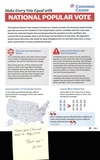
|
2022 aug 23

|
2022 aug 23

|
2022 aug 23

|
2022 aug 23

|
More... |
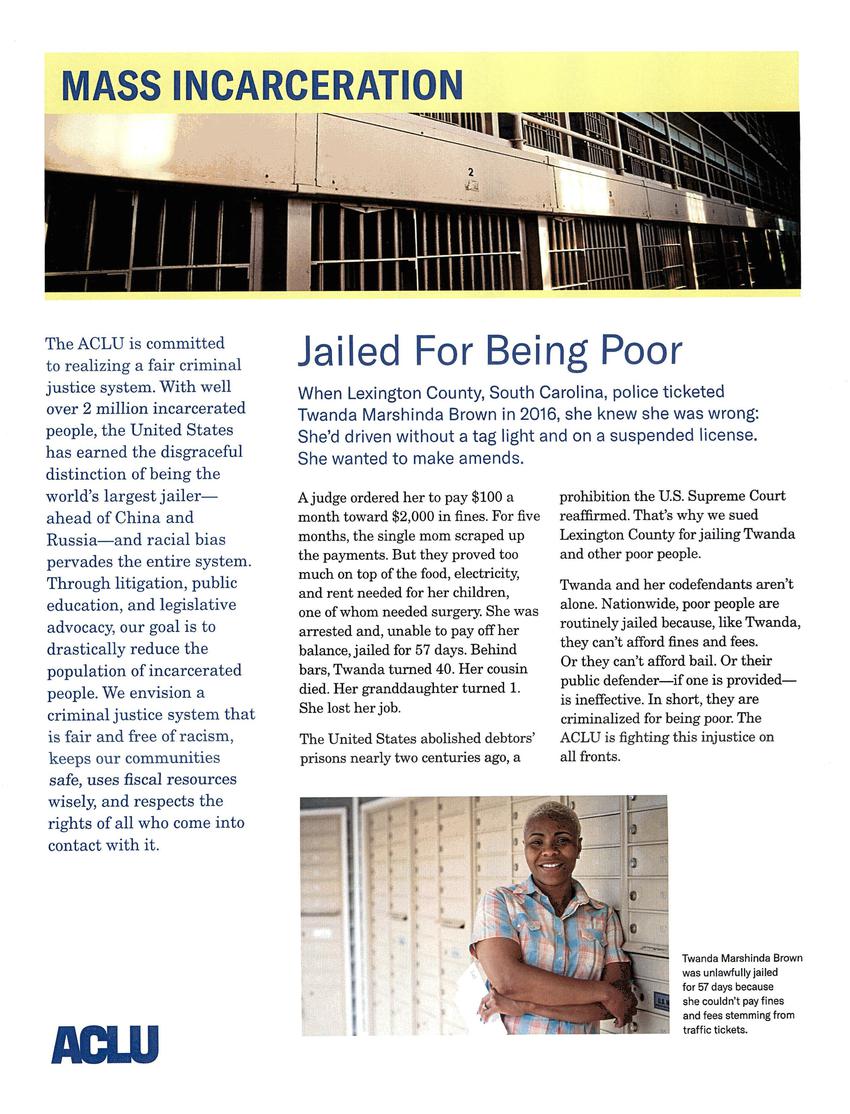
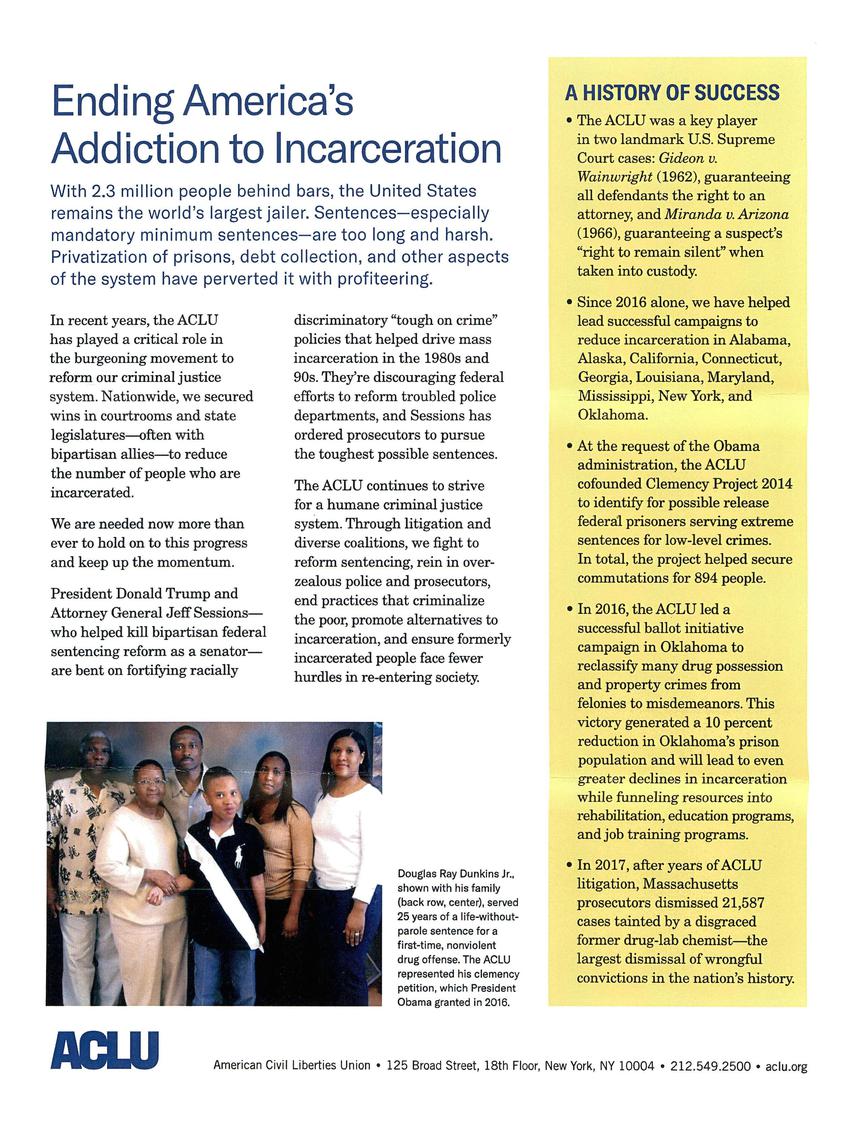
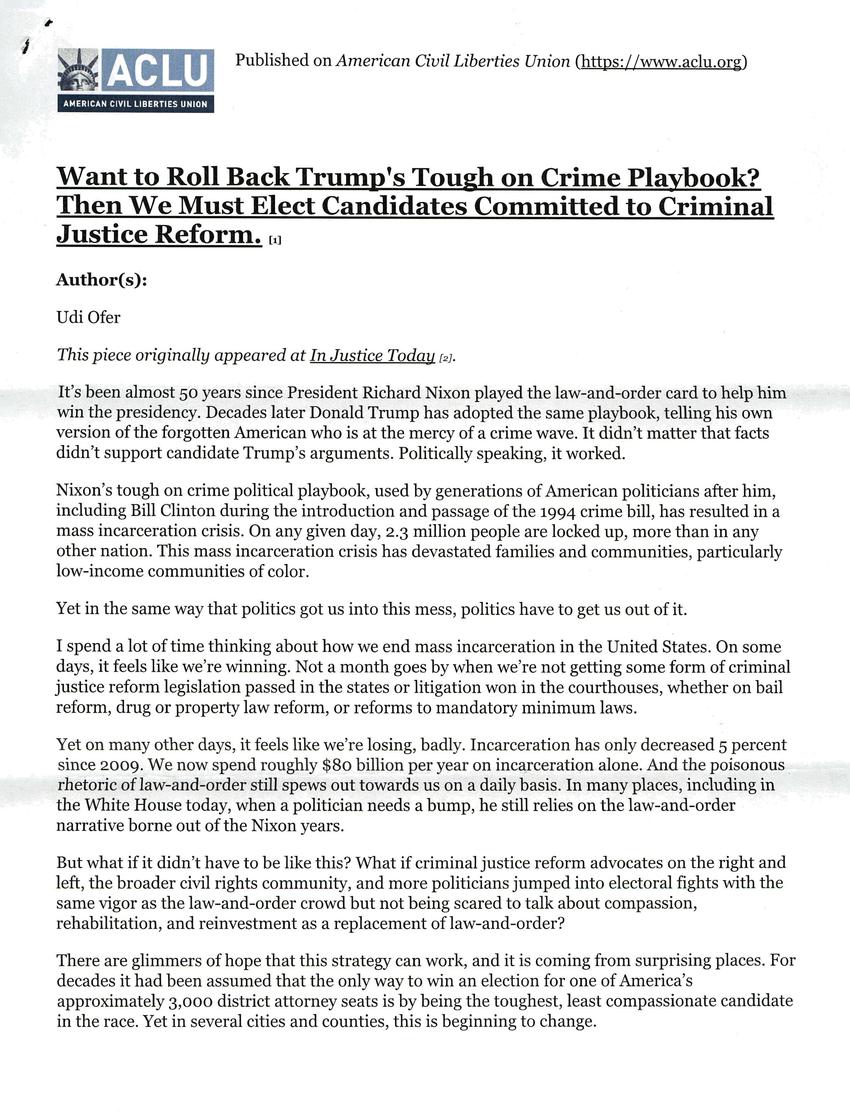
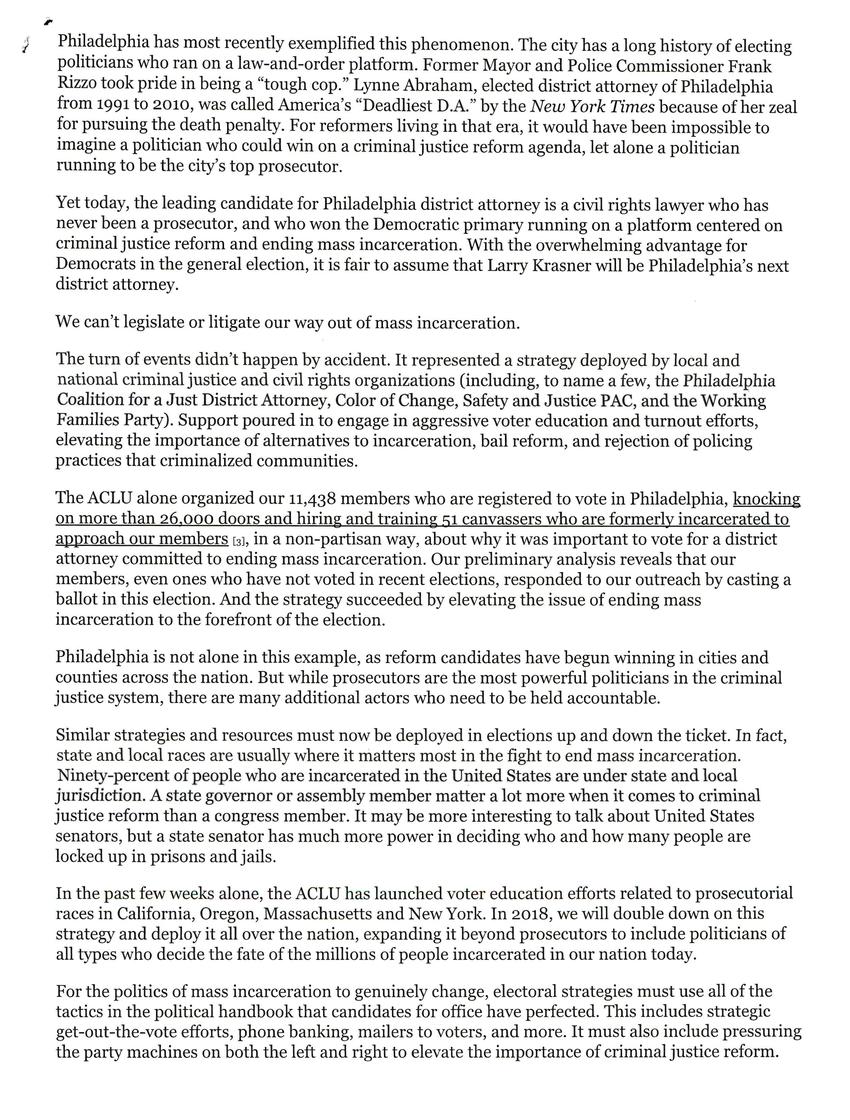
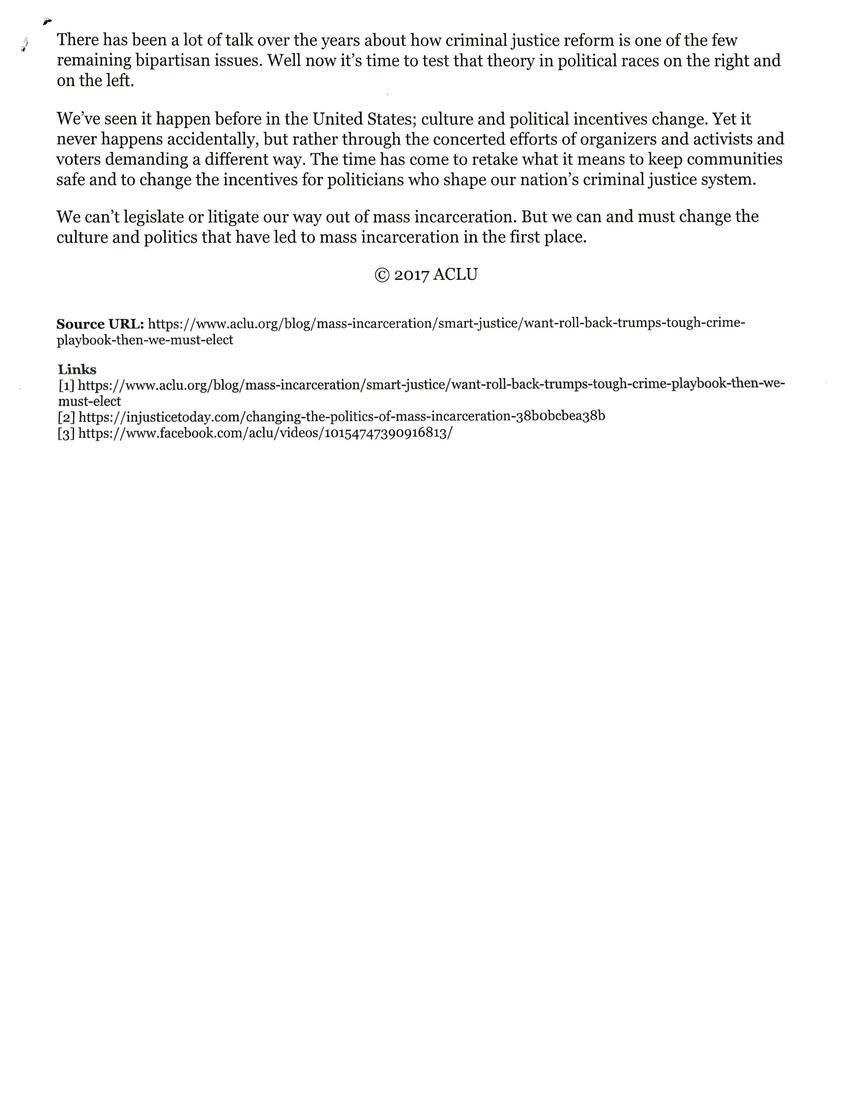
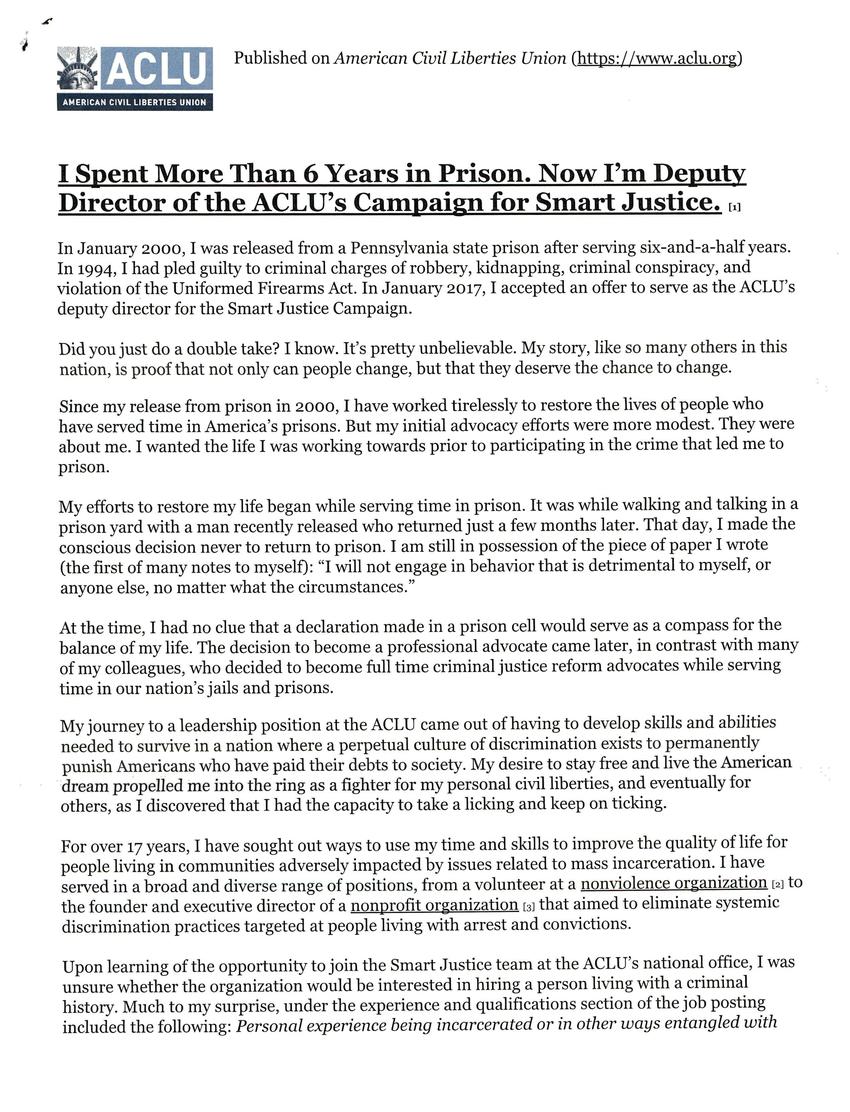

Replies